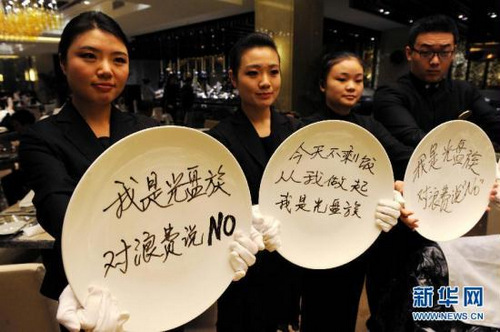
China is again struggling with issues of food only this time, it's about food waste.
Two months ago, a film called 1942 hit movie screens in China. Based on real events, it tells the tale of starvation, in a China torn by war and natural disasters. Seventy years later, China is again struggling with issues of food only this time, it's about food waste.
What came out of this business dinner? A partnership agreement? A contract?
In this restaurant in Beijing's central business district, a dish worth almost 700 yuan is left practically untouched after a business dinner. The main ingredients are appetizing: abalone, sleevefish, shrimp, but though still warm, the dish is now kitchen waste.
The chef lamented seeing so much food go to waste every day.
He Lin, chef, said:"In our restaurant, each customer consumes about two kilograms of vegetables, half a kilogram of meat and half a kilogram of staple foods."
On average, half is eaten. The other half ends as kitchen waste.
The restaurant welcomes about one thousand customers a day, which means the daily amount of kitchen waste in this restaurant alone amounts to about 1,500 kilograms' worth of food.
Massive food waste drives the need for kitchen waste recycling businesses.
In the city of Lanzhou, in northwest China, recycling worker Sun Weihan drives a truck capable of carrying five tons of kitchen waste. He makes two journeys a day. But he says it's not enough to collect all the kitchen waste from restaurants located on his assigned route.
His manager says there are 45 such trucks in his company covering more than 26-hundred restaurants in the city. Every day, the company collects 160 tons of kitchen waste.
Hao Wei, manager of local waste recycling company, said:"People's lifestyles have changed. We thought family dinners during festivals would lead to more waste, but last year's data shows we were wrong. Little is waste during family dinners. Food waste happens most often during wedding and business dinners."
The father of hybrid rice in China, Yuan Longping, condemns food waste and suggests taking measures to fight it.
Yuan Longping, academician of Chinese Academy of Engineering, said:"Our country has a large population and relatively little arable land. We made great efforts to enhance rice output, but not for it to go to waste. The government should take measures to punish food waste. Waste is shameful, and should even be seen as a crime. I've seen a lot of waste during banquets. It has to stop."
While many in China leave dishes practically untouched, a large number of people are still suffering from undernutrition. How to curb waste and balance food allocation remains a thorny issue.

Copyright ©1999-2011 Chinanews.com. All rights reserved.
Reproduction in whole or in part without permission is prohibited.